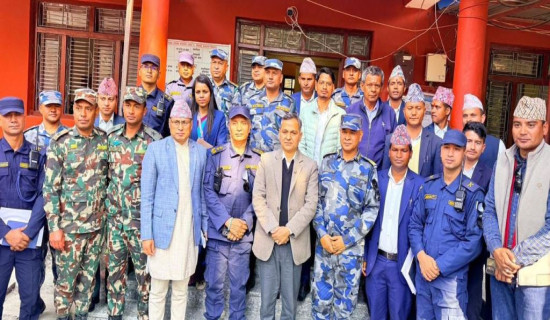- Monday, 2 March 2026
Ethos Of Press Freedom
Press freedom is an integral part of democratic society. We can't imagine a vibrant and liberal system in the absence of free press. It enables the journalists and media organisations to operate independently and report without any undue censorship. The media, regarded as the Fourth Estate, serves as a watchdog in democratic countries, helping to expose corruption, abuse of power and violations of human rights. It facilitates the public to access diverse viewpoints and engage in informed debates on important issue without any pressure and coercion. Nepal has made notable progress in the press freedom index after the restoration of democracy.
According to the World Press Freedom Index, launched by the Reporters without Borders, Nepal is placed in the 76th position among a list of 180 countries. The Constitution of Nepal stipulates freedom of expression, right to information, and press and publication rights. However, with rights comes obligation for media outlets to make themselves more responsible, fair, unbiased and self-regulatory. The first obligation of the press is to inform the people for the good of the society instead of short-term sensation. The media should be guided by its own code of conduct.
The government recently banned TikTok claiming its content posed a threat to social harmony. ‘Directives on the Operation of Social Networking 2023’ was issued to monitor and regulate social media. Some view this as a violation of the right to information and press freedom, while others argue for some level of social media oversight, sparking a contentious debate. It asserts the discourse that press freedom isn't absolute and can be constrained by lawful limitations in the pursuit of sovereignty, integrity, public order, decency, morality, or to prevent defamation or incitement to an offense.
At a function held to mark the 27th general convention of the Federation of Nepali Journalists in Kathmandu, Prime Minister Pushpa Kamal Dahal Prachanda emphasised the importance of self-regulation within the mass media rather than external control. PM Prachanda highlighted that press freedom is enshrined in the Constitution, reflecting the values of the federal democratic republic. He asserted that it is indispensable for the country and cannot be suppressed by anyone.
Prime Minister Prachanda has also called for the need to manage the surge of misinformation and suggested for establishing a self-regulatory framework to oversee the dissemination of deceptive and perplexing information that undermines social harmony and peace in the country. While talking about press freedom, we often overlook the fact that editorial viewpoints, content priorities, and presentation are highly influenced by ownership, advertising, political affiliations, and other factors. These factors are subtle, but pose a huge challenge to a truly free and independent press. It is very important to remain watchful about the biased information to protect journalistic integrity and ensure citizens’ right to accurate information. Between May 4, 2023, and May 1, 2024, the Federation of Nepali Journalists (FNJ) documented a total of 68 violations against media rights.
The violations comprised the cases of journalist detention, reporting obstruction, attacks targeting journalists and media personnel, incidents of misconduct and cases of professional insecurity among others. Each of these instances undermines press freedom and the ability of journalists to do their jobs effectively. It is important for authorities to address these violations and ensure that journalists are able to work in a safe and fearless environment. The government should enact laws and policies that protect freedom of speech and press by establishing independent regulatory bodies.
















